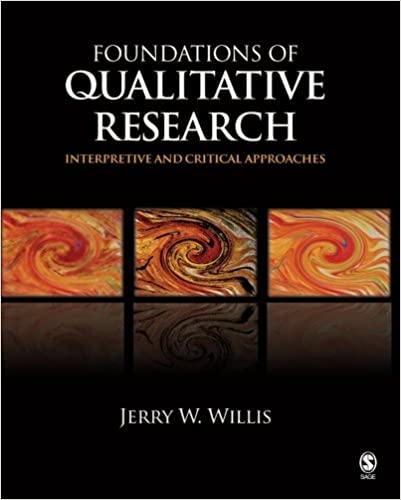Question
I need help response to my peers 1. Christoper said? In my opinion, religion can be very controversial as it is very contradictory. There is
I need help response to my peers
1. Christoper said? In my opinion, religion can be very controversial as it is very contradictory. There is a lot that leaves religion to be a source of bias, there are pros and cons to come through. This can include aspects from prejudice within religion, controversy with homosexuality, as well as issues in regards to the ways of worship that there may be throughout the different beliefs. There are all sorts of things that can be considered prejudice, such as, homosexuality, terminating a person's employment due to their religious beliefs, or anything related to color, preference, or anything that does not match to another person. Religious bigotry and discrimination might very well possibly by byproducts of how people's brains understand perceived threats, subsequent reactions, perspective denial, and self-regulation capacity. In my opinion I feel that the role of religion is absolutely paradoxical. All of this love the sinner, but not the sin. Why are these religious leaders so worried about other people's sin's when they really need to be focused on their own. This is why I personally choose to be more spiritual than religious, but I do not judge another person for their religious beliefs either. At the end of the day, if we are a better human today than what we were yesterday, I can not possibly see the problem.
2. Jaleesa said? Prejudice is a negative opinion about someone because they are part of a group. The relationship between prejudice and religion is well documented. There are certain examples of prejudice like homosexuality is seen as a sin in many religions and in certain organizations some employees have to suffer hardships due to their religion.
Religion is something that depends on a person's beliefs or one's belief in God. Those who are the proponents of a certain religion can influence people in a good or bad way.
Like many other forms of prejudice and hatred, religious bigotry and discrimination may likely be the result of how people's brains process perceived threats, following reactions, perspective denial, and self-regulation abilities. For instance, our thoughts quickly classify distinctions across social categories, including those that cause irrational aversion or dread. Religion and prejudice may help to provide security and comfort in a social and natural environment that is full of threats and dangers, both real and imagined, but they may also contribute more harm than good.
References
Jackson, L. M., & Hunsberger, B. (1999). An intergroup perspective on religion and prejudice.Journal for the scientific study of religion, 509-523.
Ng, B. K., & Gervais, W. M. (2017). Religion and prejudice.
Step by Step Solution
There are 3 Steps involved in it
Step: 1

Get Instant Access to Expert-Tailored Solutions
See step-by-step solutions with expert insights and AI powered tools for academic success
Step: 2

Step: 3

Ace Your Homework with AI
Get the answers you need in no time with our AI-driven, step-by-step assistance
Get Started


